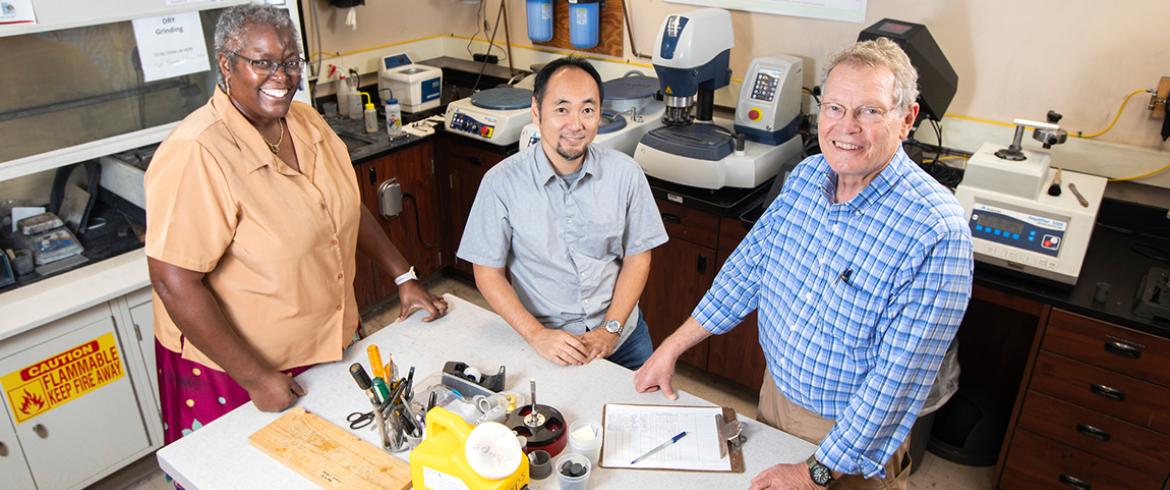
From left, Professors Simone Hruda, Fumitake Kametani and Eric Hellstrom are part of a DOE grant for creating a pipeline of underresourced students in applied superconductivity for high energy physics. (M Wallheiser/FAMU-FSU Engineering)
Through Florida A&M University, researchers at the FAMU-FSU College of Engineering recently secured a grant from the U.S. Department of Energy that ensures a future workforce more reflective of the demographics of the nation.
The new RENEW program (Reaching a New Energy Sciences Workforce) develops a strong pipeline for traditionally smaller-population undergraduate and graduate engineering students to pursue the field of applied superconductivity.
“To compete on the global stage, America will need to draw scientists and engineers from every pocket of the nation, and especially from communities that have been not plentiful in STEM,” said U.S. Secretary of Energy Jennifer M. Granholm. “The RENEW initiative will support talented, motivated students to follow their passions for science, energy, and innovation, and help us overcome challenges like climate change and threats to our national security.”
Fumitake Kametani, an associate professor in the Department of Mechanical Engineering and a faculty researcher at the Applied Superconductivity Center at the National High Magnetic Field Laboratory, is leading a team of researchers from Florida A&M University (FAMU) and Florida State University (FSU) to collaborate on this mission.
The FAMU-FSU College of Engineering is the only joint engineering college in the nation where students can enroll through either of two universities—FAMU or FSU—to earn an engineering degree. Kametani says the RENEW program at the joint college is unique because it leverages the strengths of an HBCU and a Research-1 University.
“We plan to actively recruit students at FAMU and leverage our experience of successfully mentoring students in the lab at ASC,” Kametani said. “We want to create a nurturing environment designed to help students overcome obstacles they face, often as first-generation college students.”
Opportunities Abound
FAMU pre-engineering students will have the chance to learn about research opportunities at the ASC and the ability to job-shadow undergraduate students to see what research is like. Students in the program can get additional academic assistance and mentorship to increase their success. In addition, biweekly meetings will help with common college challenges and help them stay on track.
“We believe that focusing on the student’s holistic well-being will be a key component for the success of this RENEW program,” Kametani said.
The program synergistically combines active advising and teaching at the engineering college, hands-on research mentoring at ASC, and an overarching nurturing structure designed to help students identify and resolve challenges they face early on.
Why Is this Important?
Despite having the same drive, motivation, intellect and capability as students of other races and ethnicities, engineering students from certain backgrounds are more likely than others to switch to non-STEM majors or to drop out of college entirely because they face academic or family challenges. Sometimes it’s both, Kametani explains.
“This RENEW program will increase the number of these students earning B.S. degrees in engineering and, we anticipate, increase the pipeline of them who go on for graduate studies on applied superconductivity—the critical component for DOE High Energy Physics,” Kametani said.
Who’s Involved?
Kametani’s co-investigators are Eric Hellstrom, a professor and FAMU-FSU materials science program director and Simone Peterson Hruda, an associate professor in mechanical engineering and undergraduate advising coordinator.
How Is it Funded?
The research is relevant to the High Energy Physics Accelerator Research and Development Program and is supported by the DOE Office of High Energy Physics. DOE is funding the four-year $1M grant for the joint college program through Florida A&M University, through 2026.
RELATED ARTICLES
A quest for high fields for superconductors
Engineer researchers improve performance of high-temperature superconductor wires
Engineering Mentorship Program Strengthens Pipeline of Students in Engineering Careers
